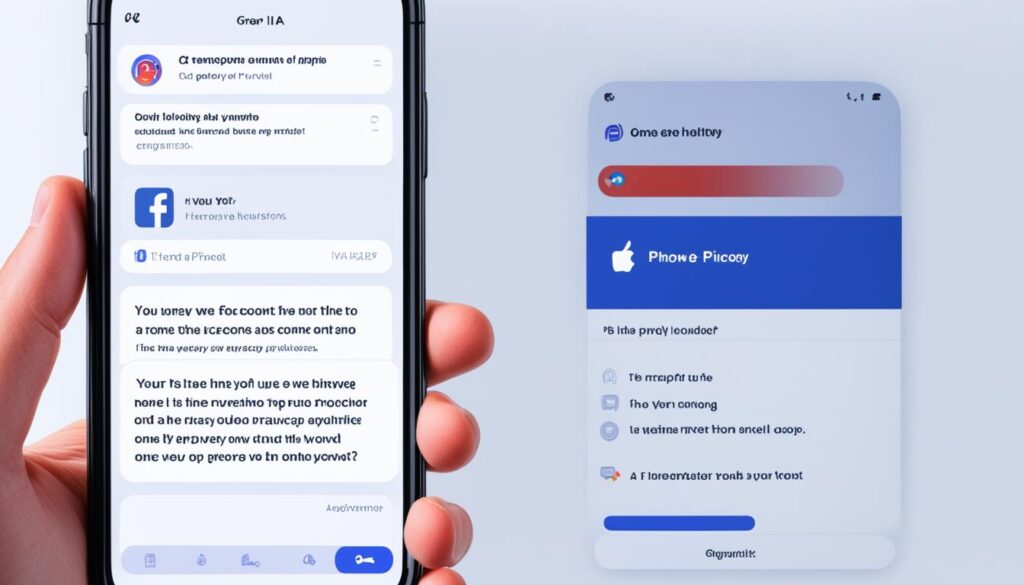Apple’s recent iOS 14 update has brought about significant changes in the world of digital advertising, particularly when it comes to tracking and targeting ads on Facebook. These changes have introduced new privacy and security measures, affecting how advertisers collect and utilize data for their ad campaigns.
With iOS 14, Apple has implemented measures like Safari Private Browsing, Communication Safety, Lockdown Mode, and improved app privacy to enhance user data protection. Advertisers now need explicit permission from users to display targeted ads based on data collected from other apps and websites. This includes sharing device locations and email lists with data brokers and installing third-party SDKs that aggregate user data.
Facebook, being one of the largest advertising platforms, has had to make adjustments to comply with these new regulations. The opt-in rate for data usage has increased since the update, signifying users’ growing concern about their privacy. As a result, Facebook’s conversion tracking and Pixel features have been affected. However, Facebook has introduced tools like Aggregated Event Measurement and strengthened its Conversion API to mitigate the impact of these changes on advertisers.
Key Takeaways
- iOS 14 update has introduced new privacy and security measures that impact Facebook ad tracking.
- Advertisers now need explicit user permission for targeted ads based on data collected from other apps and websites.
- Facebook has adjusted its platform and introduced tools like Aggregated Event Measurement to comply with the new regulations.
- The opt-in rate for data usage has increased, emphasizing users’ concerns about privacy.
- Adapting to these changes, advertisers can optimize campaigns using available tools and strategies.
The Impact of iOS 14 on Facebook Ads
The release of iOS 14 had a significant impact on the effectiveness of Facebook Ads and ad tracking. With a large number of Facebook users accessing the platform via their mobile phones, the changes to tracking methods directly affected mobile advertisers.
Advertisers relying on Facebook’s conversion tracking and Pixel features faced challenges in measuring ad performance and understanding the customer journey. The limitations imposed by iOS 14 made it harder to track user behavior and attribute conversions accurately.
However, Facebook responded to these changes by introducing two important tools that advertisers can utilize: Aggregated Event Measurement and updated Conversion API.
Aggregated Event Measurement allows advertisers to monitor ad performance and transmit web events directly to Facebook from their servers. This approach improves data sharing and privacy in a more controlled manner, reducing the reliance on browser-collected data.
“With Aggregated Event Measurement, advertisers can continue to optimize and measure their ads’ effectiveness while respecting user privacy.”
The updated Conversion API also contributes to mitigating the impact of iOS 14 on ad tracking. Advertisers can now transmit web events directly to Facebook, improving data accuracy and enabling more robust measurement and optimization.
To adapt to these changes, advertisers have had to adjust their strategies. Broad audience targeting has become a popular approach, focusing on reaching a wider pool of potential customers to compensate for the limitations in tracking.
Additionally, leveraging first-party data has become crucial for optimizing ad campaigns. By utilizing their own data and customer insights, advertisers can better understand their target audience and deliver more relevant ads.

Overall, iOS 14’s impact on Facebook Ads has forced advertisers to adapt and find new ways to measure and optimize their campaigns. While these changes have posed challenges, the introduction of Aggregated Event Measurement and the updated Conversion API have provided solutions to improve ad performance tracking and maintain data privacy.
Apple’s Privacy Prompt and the Facebook Pixel
Apple’s App Tracking Transparency Framework introduced a privacy prompt that requires apps to seek users’ permission to track their activity across various apps and websites. This prompt, known as “Ask App not to Track,” has significant implications for Facebook advertisers.
Many iPhone users have chosen to opt out of tracking, resulting in a loss of data and reduced ad relevancy. The prompt is seen by some as skewed and misdirecting, creating a negative perception of tracking. However, tracking is essential for delivering personalized and relevant ads.
Facebook has positioned itself as a champion of small businesses and personalized marketing, while Apple emphasizes user control and privacy. The prompt gives users the power to hide their engagement with apps and websites, hindering the delivery of relevant ads. Advertisers need to find alternative ways to track and optimize their ads in light of this change.
“The privacy prompt introduced by Apple’s iOS 14 has forced us to rethink our ad tracking strategies. We understand the importance of user control and privacy, but it has become challenging to deliver personalized ads without access to essential user data.” – Marketing Manager, XYZ Company
The Impact on Facebook Pixel

| Challenge | Solution |
|---|---|
| Loss of data due to opt-outs | Exploring alternative tracking methods and utilizing first-party data |
| Reduced ad relevancy | Adjusting targeting strategies and leveraging Aggregated Event Measurement |
| Negative perception of tracking | Educating users about the benefits of personalized ads and transparency in data usage |
While the Apple privacy prompt poses challenges for Facebook advertisers, it also encourages a more data-conscious approach and pushes for innovative solutions. Advertisers can overcome these challenges by adapting their strategies, exploring alternative tracking methods, and leveraging Facebook’s tools and features.
Mitigating the Impact of iOS 14.5 Changes on Facebook Ads
The recent iOS 14.5 update has further restricted Facebook’s ability to track user behavior, creating uncertainty for brands that heavily rely on Facebook ads. However, advertisers can adapt and implement new strategies to overcome these challenges and continue scaling their businesses. Here are some effective ad tracking strategies to mitigate the impact of iOS 14.5 changes:
- Track Blended Return on Ad Spend (ROAS): Instead of relying solely on individual channel performance, it’s crucial to track the blended ROAS, which looks at all ad spend and sales data collectively on a daily, weekly, and monthly basis. This approach provides a comprehensive view of advertising performance across different channels.
- Implement Custom Reports: Utilize tools like DataBox to create custom reports that allow you to track and analyze data effectively. These reports can provide valuable insights into ad performance, audience engagement, and conversions, helping you optimize your campaigns accordingly.
- Offline Conversion Tracking: By integrating with Zapier, you can enhance purchase matching and mitigate the loss of data caused by iOS 14.5 changes. Offline conversion tracking enables you to bridge the gap between online ads and offline conversions, providing a more accurate understanding of campaign effectiveness.
- Analyze Trends and Patterns: Shift your focus from daily ad performance to analyzing trends and patterns on a weekly or monthly basis. This approach allows you to identify broader audience behavior and make data-driven decisions for your ad campaigns.
By implementing these ad tracking strategies, advertisers can navigate the challenges posed by iOS 14.5 and continue driving successful Facebook ad campaigns. Remember, adaptation and optimization are key in a changing digital advertising landscape.
| Strategy | Description |
|---|---|
| Track Blended ROAS | Monitor ad spend and sales data collectively across multiple channels to evaluate overall campaign performance. |
| Implement Custom Reports | Utilize tools like DataBox to create custom reports that provide valuable insights for optimization. |
| Offline Conversion Tracking | Integrate with Zapier to enhance purchase matching and bridge online ads with offline conversions. |
| Analyze Trends and Patterns | Shift focus to a weekly or monthly analysis of ad performance to gain a broader understanding of audience behavior. |
Conclusion
The introduction of iOS 14 and its subsequent updates have had a significant impact on ad tracking, specifically for Facebook advertisers. However, these challenges have also presented opportunities for advertisers to adapt and find alternative strategies to optimize their campaigns.
By utilizing tools such as Aggregated Event Measurement and Conversion API, advertisers can still monitor ad performance and transmit web events directly to Facebook, thereby mitigating the effects of the new regulations. Furthermore, the implementation of blended attribution and adjusted tracking methods allows advertisers to gain valuable insights from available data.
It is crucial for advertisers to recognize and embrace the changing advertising landscape. The key lies in being data-focused, leveraging available data to optimize campaigns based on emerging trends and patterns. By doing so, advertisers can maximize their success in a post-iOS 14 world and continue to effectively reach their target audiences.
As the digital advertising landscape evolves, it is essential for advertisers to stay informed, adapt their strategies, and leverage the tools and data available to them. By understanding the impact of iOS 14 and Facebook Pixels on ad tracking and by embracing the changes, advertisers can continue to drive meaningful results and achieve their marketing objectives while respecting user privacy.
FAQ
How has the iOS 14 update impacted Facebook conversion tracking?
The iOS 14 update introduced new privacy and security measures that have affected Facebook conversion tracking. These measures include changes to Safari Private Browsing, Communication Safety, Lockdown Mode, and app privacy improvements.
What are the specific changes introduced by the iOS 14 update?
The iOS 14 update requires apps to display how they use user data and obtain explicit permission for data usage. Advertisers now need permission to display targeted ads, share device locations and email lists with data brokers, and install third-party SDKs that collect data about app users.
What adjustments has Facebook made to meet Apple’s requirements?
Facebook has made adjustments to its platform to meet Apple’s requirements. They have introduced tools like Aggregated Event Measurement and strengthened their Conversion API to mitigate the impact of the iOS 14 update on advertisers.
How has the iOS 14 update affected Facebook’s conversion tracking and Pixel features?
The iOS 14 update has severely impacted Facebook’s ability to track user behavior and attribute conversions. This has made it more challenging for advertisers to measure ad performance and understand the customer journey.
What tools has Facebook introduced to mitigate the impact of the iOS 14 changes?
Facebook has introduced tools like Aggregated Event Measurement and updated its Conversion API to allow advertisers to monitor ad performance and transmit web events directly to Facebook from their servers. These tools aim to improve data sharing and privacy in a controlled manner.
How has the privacy prompt in iOS 14 affected Facebook advertisers?
The privacy prompt in iOS 14, known as “Ask App not to Track,” has significant implications for Facebook advertisers. Many iPhone users have chosen to opt out of tracking, resulting in a loss of data and reduced ad relevancy.
Why is tracking essential for delivering personalized and relevant ads?
Tracking is essential for delivering personalized and relevant ads to users. It allows advertisers to understand user behavior, preferences, and interests, enabling them to serve ads that are most likely to resonate with individuals.
How can advertisers track and optimize their ads in light of the iOS 14 changes?
Advertisers can track and optimize their ads by focusing on broader audience targeting and leveraging first-party data. Implementing custom reports using tools like DataBox and utilizing offline conversion tracking with Zapier integration can also help mitigate the loss of data and improve purchase matching.
How has the iOS 14.5 update impacted Facebook ads?
The iOS 14.5 update has further restricted Facebook’s tracking abilities, causing uncertainty for brands relying on Facebook ads. Advertisers need to adapt and develop new strategies to track purchases, optimize ad campaigns, and scale their businesses.
What strategies should advertisers consider to track ad performance in a post-iOS 14 world?
Instead of relying solely on individual channel performance, advertisers should consider the collective performance of all advertising channels. Tracking the blended return on ad spend (ROAS), analyzing trends and patterns on a weekly or monthly basis, and using metrics like Marketing Efficiency Ratio (MER) can provide a holistic view of advertising performance.
How have advertisers adapted to the changes brought by iOS 14 and subsequent updates?
Advertisers have adapted to the changes by leveraging tools and strategies like Aggregated Event Measurement, Conversion API, blended attribution, and adjusted tracking methods. These changes have pushed advertisers to be more data-focused and optimize their campaigns based on available data.






